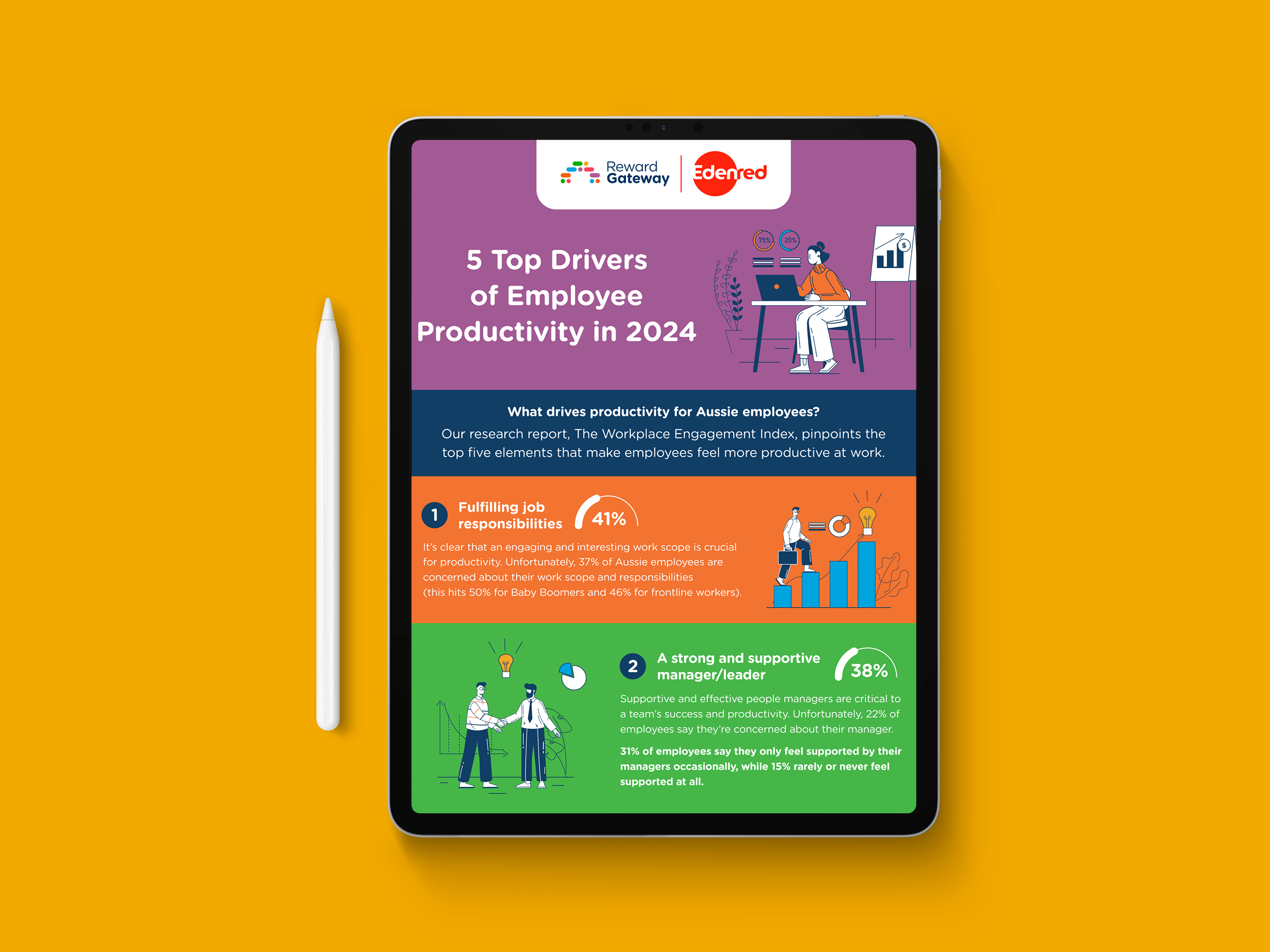Mother’s Day is around the corner, and I’m genuinely looking forward to a decent sleep-in. But (like some women I know), I also hold a bit of skepticism for the day. Can pink presents or breakfast in bed on one Sunday morning really capture the appreciation owed to women doing physically, emotionally and mentally demanding work all year round? Not quite. Yes, being a mum is rewarding, but the day-to-day grind can be tough and thankless. And it’s not just at home.
 Our Workplace Engagement Index found that a third of employees feel frequently burnt out (34%) or overwhelmed (34%), with women disproportionately impacted. In fact, women are more likely to feel stressed (51% vs. 37% of men), burnt out (41% vs. 29%), and overwhelmed (43% vs. 27%). It’s a stark reminder of the gender imbalance in workplace wellbeing and why gestures of appreciation should go beyond just one day.
Our Workplace Engagement Index found that a third of employees feel frequently burnt out (34%) or overwhelmed (34%), with women disproportionately impacted. In fact, women are more likely to feel stressed (51% vs. 37% of men), burnt out (41% vs. 29%), and overwhelmed (43% vs. 27%). It’s a stark reminder of the gender imbalance in workplace wellbeing and why gestures of appreciation should go beyond just one day.
Should this matter to employers? Absolutely. Not only does the mental and physical wellbeing of your workforce impact their productivity, ability to innovate and your bottom line, it also impacts your employees’ availability and mobility.
So, what can business leaders do to support their workforce and celebrate the mothers who are in the mix? Below are 9 ideas that will help you celebrate the mums at your workplace on Mother’s Day, as well as all year round:
| 1. Offer truly autonomous and flexible work arrangements |
| 2. Create opportunities for parents to support each other |
| 3. Make sure there is visible support from leaders in your organisation |
| 4. Get kids involved in workplace fun |
| 5. Provide practical financial benefits that impact the household |
| 6. Welcome the 'surprise visitors' to your online meetings |
| 7. Create a seasonal eCard on your recognition platform |
| 8. Encourage employees to share real stories about the realities of parenting |
| 9. Provide pathways for women to grow into leadership positions |
1. Offer truly autonomous and flexible work arrangements
Hybrid work has become a key feature of modern work life, offering flexibility but also posing challenges in balancing professional and personal responsibilities. Many employees continue to navigate workspaces that double as home offices, with makeshift dining tables and the constant balancing act of calls, childcare, and household chores. A key to reducing this stress is offering genuinely flexible work hours.
According to the 2023-24 Australia's Gender Equality Scorecard, 81% of Australian women said that flexible work arrangements are vital to helping them manage both their professional and personal responsibilities.
 As some employees return to the office full time, it's important to consider their evolving needs. While some workers thrive in an office environment, many still crave the flexibility they had during remote work. Employers need to acknowledge that the transition back to full-time office work can be challenging for those who have adjusted to the benefits of flexibility.
As some employees return to the office full time, it's important to consider their evolving needs. While some workers thrive in an office environment, many still crave the flexibility they had during remote work. Employers need to acknowledge that the transition back to full-time office work can be challenging for those who have adjusted to the benefits of flexibility.
To truly support your team during this shift, now is the time to reinforce a culture of trust and flexibility. Consider offering hybrid work options where possible and prioritising open, transparent communication. This will help employees feel valued, respected, and empowered to balance their professional and personal lives.
2. Create dedicated opportunities for parents to support each other
You probably know the adage, “It takes a village to raise a child,” but did you know it also takes a village to keep a parent sane at work? Having a group of co-workers to lean on when you’re trying to work out how to soothe a teething toddler, or who you can have a laugh with over your child’s painting mishaps or mud-riddled tantrums can help you keep your cool.
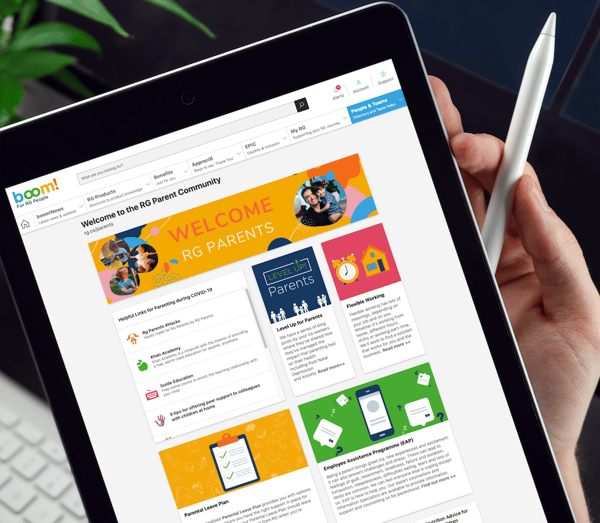
So if you haven’t already, create a dedicated ‘Parents Hub’ on your employee communications platform, or a chat group to encourage parents to start sharing their questions and answers. Our RG Parents channel is one place where baby spam is 100% welcome. It builds a sense of community, and provides another place for our people to offer support – both tactical and emotional! – when things get a little hectic at home.
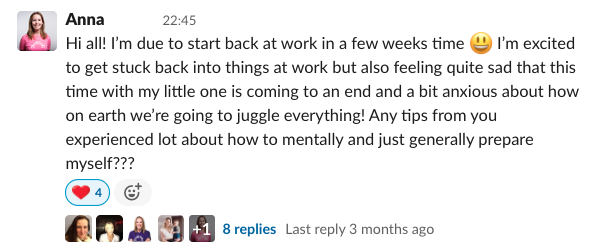
3. Shout support from the top
Becoming a new mum can be absolutely terrifying, but knowing that your newborn is being celebrated by the leaders in your organisation can provide an immense sense of relief and belonging.
If your employees are comfortable sharing pics and birth announcements, then encourage your CEO or senior leaders to welcome these 'new members of your work family' into the fold.
4. Get kids involved in workplace fun
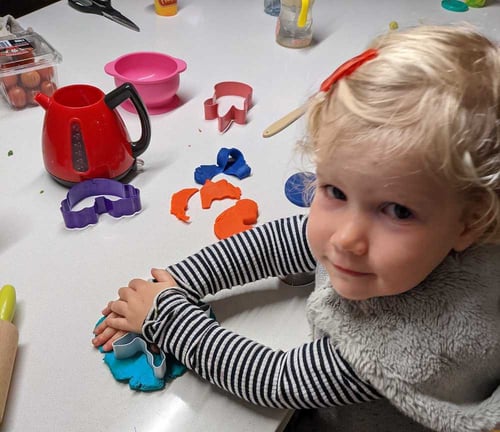 There is no untangling family life with work life, so you may as well embrace it and include employees’ kids in holiday parties and other company get-togethers. My kids adore visiting our workplace, but don’t let the lack of in-office events stop you.
There is no untangling family life with work life, so you may as well embrace it and include employees’ kids in holiday parties and other company get-togethers. My kids adore visiting our workplace, but don’t let the lack of in-office events stop you.
One of our clients created and published a book full of artworks by their employees’ kids. One Easter, RG invited all employees to enter an Easter Bonnet Competition. Kylie Terrell, one of Employee Engagement Consultants, took part and our Culture Team sent her daughter a surprise in the mail for participating.
'Not only did the baking kit and cookie cutters delight a very interested toddler, they enabled me to have positive conversations about work at home, and helped my daughter understand that my work life is part of who I am and important to me,' Kylie said, 'It helped her learn that work can and should be fun!'
5. Provide practical financial benefits that impact the household
An employee benefits program that extends savings to the entire household can help make family budgeting that little bit easier. Not only do employees get to amplify their disposable income and enjoy discounts on their groceries, entertainment, online shopping and travel all year round, you can also remind them to make the most of the deals that come at Mother’s Day!
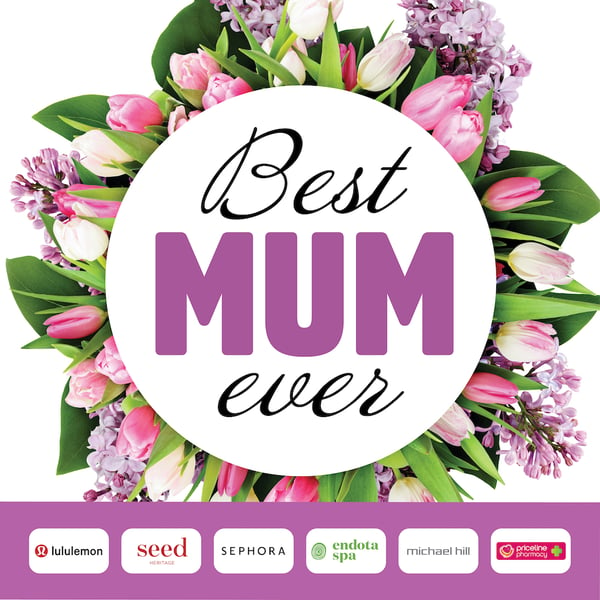
6. Welcome the 'surprise visitors' to your online meetings
I don’t know a single working mum who hasn’t had a 'CNN Dad' moment in the last few years. Occasionally, our 'miniature co-workers' ignore the closed door and just join our online meetings – but the response our real co-workers have to these unexpected drop-ins can make or break our day.
Thankfully, at Reward Gateway, one of our company values is 'Be Human.’ That means that our colleagues can turn up to an early meeting with The Wiggles playing in the background or catch a toddler trying to crawl onto laps to get screen time – and it’s perfectly fine.
'It makes a world difference that my colleagues (parents or not) don't even flinch,' Kylie shares, 'I know that I can bring my whole self to work. And if there’s ever a time I can’t get care for my daughter and she’s around while I am also trying to kick goals at work, that’s OK.'
7. (Make and) Send a Mother’s Day eCard
 We love peer-to-peer employee recognition and believe R&R programs get ongoing traction when companies make the most of seasonal celebrations and create more opportunities for people to recognise each other. If you’re already designing eCards for Christmas, Easter, Eid or PRIDE month, why not add Mother’s Day eCards to the mix too?
We love peer-to-peer employee recognition and believe R&R programs get ongoing traction when companies make the most of seasonal celebrations and create more opportunities for people to recognise each other. If you’re already designing eCards for Christmas, Easter, Eid or PRIDE month, why not add Mother’s Day eCards to the mix too?
8. Be real about the challenges of being a working mum
Your internal company blog can be a powerful tool for creating a sense of community, especially for employees looking for support. If you haven’t already, ask the people in your organisation if they’d be willing to share their experiences of parenthood on a blog post.
9. Provide leadership opportunities and pathways for women to grow into those roles
The Australian Women at Work report found 2 out of 3 women want to see more working mothers in senior roles and 50% want to participate in leadership development programs or careers coaching.
Rather than simply returning to old ways of working, now’s an opportunity to embrace a turning point and seek out innovative ways to support employees' long-term success.
Is it time to consider part time or job share options for senior positions? Are you leveraging the business insight from your reward and recognition program to expand your talent pool within the organisation? In addition, women want to see senior leaders encouraging both men and women to work flexibly, in a way that allows for family engagement.
Bonus tip: Be respectful of (and make space for!) the people who aren’t mums
 While I am all for encouraging employers to help their people bring their whole self to work and celebrate the parts of their life they’re really proud of (like being a mum!), it’s also equally important to be mindful of those who choose not to be or can’t be mothers. There may also be some women who are grieving the loss of a child or a mother, undergoing fertility treatments or in the midst of a tough decision that affects their family.
While I am all for encouraging employers to help their people bring their whole self to work and celebrate the parts of their life they’re really proud of (like being a mum!), it’s also equally important to be mindful of those who choose not to be or can’t be mothers. There may also be some women who are grieving the loss of a child or a mother, undergoing fertility treatments or in the midst of a tough decision that affects their family.
It’s important to create space for celebration – but none of it should be mandatory. Give people the choice of whether to participate, and choose how they want to engage (or not).
Each workforce is a mixed bunch with different needs. The more flexible we are in supporting the different walks of life that walk through our office doors, the more engaged our people will be!
I’d love to know - is your company celebrating Mother’s Day? Have they initiated something innovative or shown support for the parents in your workplace in a new way this year? Reach out and let me know!
 Phoebe Hutton
Phoebe Hutton


